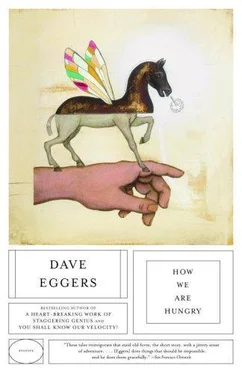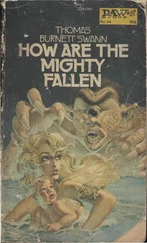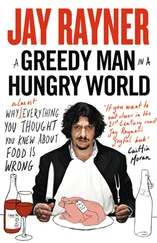Dave Eggers - How We Are Hungry
Здесь есть возможность читать онлайн «Dave Eggers - How We Are Hungry» весь текст электронной книги совершенно бесплатно (целиком полную версию без сокращений). В некоторых случаях можно слушать аудио, скачать через торрент в формате fb2 и присутствует краткое содержание. Год выпуска: 2005, Издательство: Vintage Canada, Жанр: Современная проза, на английском языке. Описание произведения, (предисловие) а так же отзывы посетителей доступны на портале библиотеки ЛибКат.
- Название:How We Are Hungry
- Автор:
- Издательство:Vintage Canada
- Жанр:
- Год:2005
- ISBN:нет данных
- Рейтинг книги:3 / 5. Голосов: 1
-
Избранное:Добавить в избранное
- Отзывы:
-
Ваша оценка:
- 60
- 1
- 2
- 3
- 4
- 5
How We Are Hungry: краткое содержание, описание и аннотация
Предлагаем к чтению аннотацию, описание, краткое содержание или предисловие (зависит от того, что написал сам автор книги «How We Are Hungry»). Если вы не нашли необходимую информацию о книге — напишите в комментариях, мы постараемся отыскать её.
A Heartbreaking Work of Staggering Genius
How We Are Hungry — читать онлайн бесплатно полную книгу (весь текст) целиком
Ниже представлен текст книги, разбитый по страницам. Система сохранения места последней прочитанной страницы, позволяет с удобством читать онлайн бесплатно книгу «How We Are Hungry», без необходимости каждый раз заново искать на чём Вы остановились. Поставьте закладку, и сможете в любой момент перейти на страницу, на которой закончили чтение.
Интервал:
Закладка:
Every night, after dinner, Pilar and Hand bought ice cream from a man who had been burned on half of his face. Burned or perhaps it was coming from below — his face had great growths on it, oval and coarse, like the ass of a boar. Usually the moon was yellow behind Vaseline. Sometimes there was hay on the street.
One night they went to see the huge migratory turtles huff ashore and lay their eggs, hundreds of eggs, all of them soft and slathered in gel. They stood behind one enormous one as it swept sand into its hole, sprinkling each group of eggs.
Some days they could hear people playing tennis, but they could not see the court, and even looked for it one day and could not find it. They watched a man painting a picture of the beach; he welcomed their watching and talking. He was from Philadelphia and had had a bad year, a litigious divorce and a friend dead, killed driving to Tahoe.
They slept together once sober and it was awkward — they were not lovers but friends playing Twister. They went back to their original plan the next night. They drank a bit, and then went to bed, just under the surface of consciousness, feeling no edges. Someone watching them from afar might ask: How did they speak to each other? The answer: With the warmth of very old friends, though they were not yet old. How did he touch her? Clumsily, for he was clumsy and she was critical. How did she kiss him? Desperately, pulling and pushing, like a woman trying to get to the bottom of a deep pool.
When they walked usually there were stones in their shoes, because the road was dotted with pebbles and their shoes were loose.
They were leaving Alta the next afternoon — Pilar for home and Hand for Granada and there were no future plans — so they rented boards early and were in the water by nine. It was an uncomplicated day.
Hand was out in the sea before her and she watched him until she was too hot to stay dry. She paddled past the breaks, which meant pushing through four full waves collapsing, like drunks, onto her. Each time she would have to either push the board’s nose into the wave and hope she stayed on, or would preemptively surrender, diving off, waiting for the board to bungee away and come back to her. She had never been so tired.
Hand soon shot past her, on a bigger wave, one that would have crushed Pilar had she tried it. She watched him speed into the beach, looking like he was going faster than the wave. She noticed that people riding waves seem to be moving much faster than waves do when they’re traveling without passengers. Hand had caught this one at the perfect moment and was riding it left, on and on, as it sped away and toward the estuary. It seemed endless. He waved to Pilar. She waved back. It’s weird, Pilar thought, to wave to someone while they’re standing on water. She maybe loved him.
She sat up again, watching the flat blue for growths.
If there were a question that needed to be answered in this story it would be not one but many, and would be these: How can a world allow all this? Allow these people to live so long? To travel all these miles south, to a place so different but still so comfortable, and in that place, meet again? To allow them to be naked together for the first time? What would their parents think? What would their friends think? Would anyone object? Who would plan for them? How many times in life can we make decisions that are important but will not hurt anyone? Are we obligated — maybe we are — to say yes to any choice when no one will be hurt? We use the word hurt when talking about things like this because when these things go wrong it can feel as if you were hit in the sternum by a huge animal that’s run for miles just to strike you.
In two hours, she found two waves. Waves were something she cared about now. But she began to care more about seeing them than catching them, and more about catching them than riding them, and above all she wanted to simply stay out beyond the breaks. Because after each ride, the trip back, past the breaks, was too much.
Her arms seemed so thin, like narrow dowels being pushed through syrup. The ache at her shoulders brought her near tears. It wasn’t right that it should be so hard, especially here. The waves would crash ahead of her and the tall strong foam would roll at her, and would then run over her. Knocked off the board, she would scrape the water off her face, spit, expel snot, jump back on the board, paddle twice, achieve maybe ten feet of progress out, and then get knocked over again. Her spirit was broken many times.
She closed her eyes. Opened them, closed them. She could end this world or allow it. This was a moment when a believer, a thoughtful believer, would think of God’s work, and how good it was. The waves were perfect to the right and perfect to the left. Far away there were loud long hoots from the man in the cowboy hat, riding a long low slow breaker all the way in. Pilar thought of the man at her church group who taught everyone how to win at pinball. She thought of curved penises. For a while she was enchanted by those who proposed that God was in nature, was all around us, was the accumulated natural world. “God,” they would suggest, “is in all living things. God is beauty, God is in the long grass and the foam finishing a waterfall.” That sort of thing. She liked that idea, God being in things that she could see, because she liked seeing things and wanted to believe in these things that she loved looking at — loved the notion that it was all here and easily observable, with one’s eyes being in some way the clergy, the connection between God and—
She saw Hand, almost at the estuary, finally end his ride, nimbly stepping off his board and into the water, as if descending from a chariot. He stood for a second, knee-deep, and adjusted his bathing suit. Then he doubled over again and dumped his head. Had his hair had gone dry during his ride? Incredible. He wouldn’t be back for a while.
But a single contained God implied or insisted upon a hierarchy that she didn’t accept. God gave way to a system of extremes, and implied choices, and choices required separations, divisions, subtle condemnations. She was not ready to choose one God, so there would not be this sort of god in Pilar’s world, and thus the transcendental deity—
But then why God at all? The oil-wet water was not God. It was not the least bit spiritual. It was oil-wet water, and it felt perfect when Pilar put her hand into it, and it kissed her palm again and again, would never stop kissing her palm and why wasn’t that enough?
Her board was pointing almost directly toward the now-dimming sun. The dimming sun made the water seem even more like oil, and where the sun did not highlight the water, the water was black. The sun was large and was more three-dimensional than usual. The water was black where the sun wasn’t making it gold. The water was getting warmer and the surfers around her became with each passing minute more abstract, closer to silhouettes, moving in slow motion.
She sat up on the board, straddling it. She didn’t want to surf. She wanted to sit here for a long time, the waves behind her, ridden by the vague black figures. She wanted only to sit and stare ahead and wait for more of the water to go golden.
When the sun fell and the water turned black she would ride the last wave in and sleep. She felt that she knew how her old age would feel. She would be too tired to move. She knew that if she rode in she would not be able to ride out again.
They left the town at dusk. The roped road was potholed completely, full of slow-driving tourists in SUVs, so careful with their rentals, like elephants stepping gingerly around puddles. Pilar and Hand passed and left them and drove away from a dusk gaudy with purple. The road went from dirt to gravel to finally pavement unpotholed, but remained two lanes, winding back and forth over hills and down hills and always under a perfect canopy of trees with long fingers overhead laced.
Читать дальшеИнтервал:
Закладка:
Похожие книги на «How We Are Hungry»
Представляем Вашему вниманию похожие книги на «How We Are Hungry» списком для выбора. Мы отобрали схожую по названию и смыслу литературу в надежде предоставить читателям больше вариантов отыскать новые, интересные, ещё непрочитанные произведения.
Обсуждение, отзывы о книге «How We Are Hungry» и просто собственные мнения читателей. Оставьте ваши комментарии, напишите, что Вы думаете о произведении, его смысле или главных героях. Укажите что конкретно понравилось, а что нет, и почему Вы так считаете.












